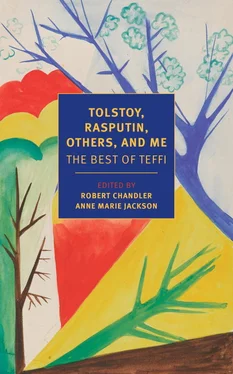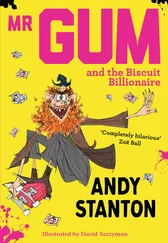It was not long after the war with Japan. [1] Russia’s defeat in this war (1904–05) further undermined the authority of the already unstable regime.
Forty-five years ago. An extraordinary time, and it comes back to me in bits and pieces, as if somebody had shuffled the pages of a diary, mixing up the tragic entries with stories so ridiculous that one can only shrug in disbelief. Did all that really happen? Was life really like that? Were other people, were we ourselves, really like that?
But yes, that is exactly how it was.
Russia had swung to the left overnight. There was unrest among the students, there were strikes among the workers, and even old generals could be heard snorting about the disgraceful way the country was being run, and making sharp criticisms of the Tsar himself.
Sometimes all this became the stuff of farce. In Saratov, the Chief of Police joined up with Topuridze—a revolutionary who had just married a millionairess—to publish a legally authorized Marxist newspaper. [2] Volna , first published in March 1906.
Things could hardly have got more absurd.
The Petersburg intelligentsia took keen delight in the new political climate. One of our theatres put on The Green Cockatoo [3] A play by the Austrian writer Arthur Schnitzler.
—a previously censored play about the French Revolution. Journalists wrote satirical pieces undermining the establishment, poets wrote revolutionary verses and actors declaimed them on stage to enthusiastic applause.
The university and the technological institute were temporarily closed, and political meetings took place in their buildings. Ordinary, respectable city folk would wander quite freely into these meetings, draw inspiration from the shouts of “Hear, hear!” and “Down with this! Down with that!”—still a novelty at the time—and take any number of half-baked, badly formulated ideas back home to their friends and families.
New illustrated journals appeared: one, edited by Shebuev, was called the Machine Gun. [4] A radical satirical journal produced by the journalist Nikolai Shebuev in 1905–06. The back page of the first issue carried a photograph of the Tsar’s “October Manifesto” with a bloody handprint across it and the caption “Major General Trepov had a hand in this document”. Trepov had played an important role in the suppression of the many strikes and rebellions that swept Russia in 1905. Only five issues of the journal were printed. Shebuev was arrested and sentenced to a year’s imprisonment.
The cover of one issue, if I remember correctly, was adorned by a bloody handprint. These publications took the place of the respectable Wheatfield [5] Wheatfield ( Niva ) was an illustrated weekly journal. It presented a wide selection of good quality literature to a broad readership.
and sold out quickly, bought eagerly by a rather surprising readership.
I remember once, at my mother’s house, meeting one of her old friends, the widow of an important dignitary. This dignitary had been a friend of Katkov and a diehard conservative of the type we later came to call “bison”. [6] The word “bison” ( zubr ) came to be used to refer to reactionary members of the Duma (the Russian parliament) drawn from the landowning classes. The nickname hints at an analogy between the official protection afforded such figures and the conservation of “endangered species” close to extinction. (With thanks to Boris Dralyuk for help with this note.
“I should like to read the Machine Gun ,” said this dignitary’s widow, for some reason pronouncing the dreadful word not with a “u” but with a clipped “e”: “Machine G e n”. “But I don’t dare buy it myself, and I don’t like to send Yegor out to get it. I feel Yegor doesn’t approve of the latest tendencies.”
Yegor was her old manservant.
There was also an occasion when my uncle and I were at my mother’s. This uncle had been close to the royal court and, when we were children, he had often brought us sweets from the Tsar’s table (which was quite the done thing back then). The sweets were made by the Tsar’s own confectioner, and were in white wrappers with trimmed edges. We had chewed on them with awe. Now, pointing at me, my mother said to my uncle, “ This young lady mixes with socialists.”
It was as if she were talking about some savage she had seen devouring a raw partridge, feathers and all. Something rather revolting—yet still impressive.
“Now there’ll be trouble,” I thought.
But to my surprise, there was nothing of the kind.
My uncle smiled archly: “Well, my dear,” he said, “young people must move with the times.”
This was the last thing I had expected.
So how was it I began to move with the times?
In our circle of friends there was a certain K.P., [7] Konstantin Platonov, son of Senator S.F. Platonov.
the son of a senator. Much to his father’s chagrin, he was closely involved with the Social Democrats. [8] The Russian Social Democratic Party was a revolutionary socialist party formed in 1898. In 1903 it split into two factions: the Bolsheviks (led by Lenin) and the Mensheviks.
He was a restless soul, torn between Lenin’s pamphlet “One Step Forward, Two Steps Back” [9] “One Step Forward, Two Steps Back (The Crisis in our Party)”, was published in Geneva in 1904.
and the poems of Balmont.
“You really must go and see Lenin in Geneva,” [10] After a period of internal exile in Russia, Lenin had left for Geneva in 1900. At the time Switzerland was something of a hotbed of radicalism—a number of Russian revolutionaries studied at the universities of Geneva and Zurich.
he would say to me.
“Why Lenin? Why should I go and see Lenin?”
“Why? To study with him. That’s just what you need.”
At that point I had only just started to publish my work. My articles and sketches were being published in the Stock Exchange Gazette , [11] Stock Exchange Gazette ( Birzhevye vedemosti ) was a liberal St Petersburg paper to which Teffi was a regular contributor. In 1917 it was closed by the Bolsheviks.
a paper devoted mainly to castigating the city fathers—those who had managed to grab for themselves a piece of the public “pie”. I was contributing to this castigation. One of the popular topics of the day was a plan by the city governor, Lelyanov, to fill in the Catherine Canal. [12] This plan by the mayor of St Petersburg, P. Lelyanov, to fill in the Catherine Canal (Yekaterinsky Canal, now the Griboyedov Canal) was never put into effect.
I had written a verse fable entitled “Lelyanov and the Canal”:
One day Lelyanov, on his morning stroll,
Clapped eyes upon the Catherine Canal,
And said, a frown upon his face,
“You really are a waste of space
Not even a canal, just a disgrace!
No one can swim in you, or sail or drink your water
In short, you just don’t do a thing you ought to.
I’ll fill you in, you pitiful canal.
I know I can, and so I shall!”
So thought the city chief, his brow now stern,
When out from the canal there swam a germ.
“What lunacy,” it said “infects your brain?
Planner Lelyanov, better think again!”
The Tsar was against Lelyanov’s plan, so he very much liked my fable. The paper’s editor, Stanislav Propper, was “rewarded by a smile from his majesty”, and added an extra two kopecks to my fee. In those days the only journalist who could command the legendary fee of ten kopecks was Vladimir Nemirovich-Danchenko. In short, a brilliant career lay ahead of me. What did I have to learn from Lenin?
Читать дальше












